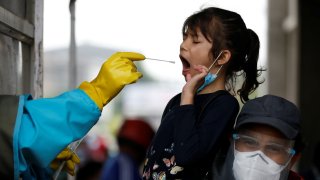
The infamous nasal swab Covid test could soon become a thing of the past.
During Senate testimony this week, White House chief medical advisor Dr. Anthony Fauci and U.S. Food and Drug Administration acting commissioner Dr. Janet Woodcock discussed an increasingly popular theory — that throat swabs could detect Covid's omicron variant more effectively than nasal swabs, especially in rapid antigen tests.
"There have been recent reports that, in fact, [there may be higher] sensitivity and ability to detect [the virus] in a swab of the throat versus the nasopharynx, at least with omicron," Fauci told the Senate Health, Education, Labor and Pensions committee on Tuesday. "I think it needs to be validated and verified."
Omicron, which is said to be less detectable than other variants in current testing models, exists primarily as an upper respiratory virus, according to recent reports. Early studies say this means the variant could be detected in saliva sooner than in the nose.
Get Tri-state area news delivered to your inbox.> Sign up for NBC New York's News Headlines newsletter.
Some countries have already implemented variations of the throat swab method. On Monday, Israel's health ministry said that those self-testing for the virus must swab both the nose and throat to increase odds of detection. And as early as May 2020, the U.K. government shared an instructional video on its website to show how to take a nose and throat sample with a single swab.
In the U.S., nationwide testing demand is extremely high, and rapid tests are seen as only partially reliable: According to the Centers for Disease Control and Prevention, at-home antigen tests like BinaxNow are roughly 85% accurate at detecting positive cases. More reliable rapid tests could detect the virus more quickly and accurately, potentially easing the nation's demands for test kits.
At the Senate hearing, Woodcock said the FDA could "act very rapidly" to approve the new method if research confirms its effectiveness, but manufacturers would need to "change the test configuration to accommodate the larger swab."
Money Report
For now, she said, all testing kits should be used as designed.
Other medical professionals in the U.S. are preaching caution, too.
Don Milton, a professor of environmental and occupational health at the University of Maryland School of Public Health, told the Wall Street Journal on Tuesday that his own labs have shown omicron can be traced more effectively through saliva. If corroborated, Milton said, dispersing throat swabs swiftly could help decrease the risk of people getting false negatives and unwittingly spreading the virus.
But, he noted, more research is needed to confirm his results. "There's a known risk of false negatives with nasal swabs and an unknown risk of false positives with throat swabs," he said.
At the Senate hearing, CDC director Dr. Rochelle Walensky noted that her agency currently "routinely" counts PCR test results, while "passively" reporting rapid test results. If testing methods change, the agency's collection methods could potentially adapt, too.
"Less important is counting that case than it is that [the] person stays home, isolates, does the right thing…before transmitting," Walensky said, referring to people exhibiting mild to severe Covid symptoms. "One of the really important purposes of these rapid tests, even if we don't count them, is to empower the public to do the right thing through this pandemic."
Sign up now: Get smarter about your money and career with our weekly newsletter
Don't miss:
You should report your at-home Covid test results, experts say — here’s how
Bill Gates: Once the omicron variant passes, Covid will be more like the seasonal flu






